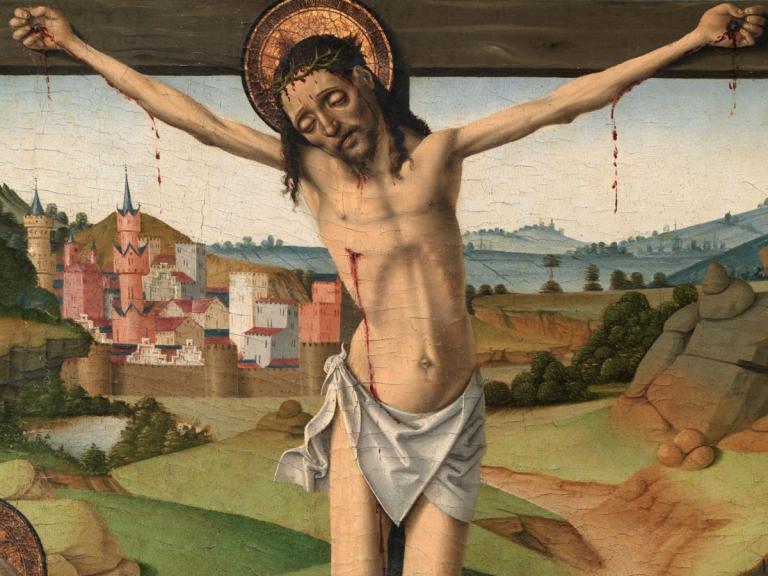
A sermon preached by a junior research fellow at Trinity College in Cambridge over a week ago has brought cries of heresy against the fellow, Joshua Heath. Heath preached during his Evensong sermon that historical, non-erotic depictions of Christ’s penis “urge a welcoming rather than hostile response toward the raised voices of trans people.” He added, “In Christ’s simultaneously masculine and feminine body in these [art] works, if the body of Christ as these works suggest the body of all bodies, then his body is also the trans body.” He backed his claim by showing three medieval paintings, including the 13th-century Pieta by Jean Malouel and a picture of the Crucifixion from the 14th-century Prayer Book of Bonne of Luxembourg.
In pointing to the image in the Prayer Book, Heath stated that the spear wound in Jesus’s side, which is described in John 19:34, “takes on a decidedly vaginal appearance.” He also pointed out how the blood in the image of the Pieta flows toward Jesus’s groin. According to the Daily Telegraph, the sermon was not well-received in the Anglican service, which included children, and a number of congregants yelled out “heresy” during the sermon. One anonymous congregant wrote a letter to the college dean, Dr. Michael Banner, saying, “I left the service in tears… I am contemptuous of the idea that by cutting a hole in a man, through which he can be penetrated, he can become a woman. I am especially contemptuous of such imagery when it is applied to our Lord, from the pulpit, at Evensong. I am contemptuous of the notion that we should be invited to contemplate the martyrdom of a ‘trans-Christ,’ a new heresy for our age.”
Banner, however, defended the sermon, writing that the sermon “suggested that we might think about these images of Christ’s male/female body as providing us with ways of thinking about issues around transgender questions today.” He went on to write, “For myself, I think that speculation was legitimate, whether or not you or I or anyone else disagrees with the interpretation, says something else about that artistic tradition or resists its application to contemporary questions around transsexualism.” He concluded that he would not have invited someone to speak who would, “speak against the Christian faith.”
The sermon has received criticism across the pond as well, with Franklin Graham sharing Fox News’s reporting on the incident on Facebook and calling the sermon “repulsive” and shameful.” “The Bible warns us about false teachers,” he wrote. “This speaker and the dean at the University of Cambridge who defended him are false teachers, preaching heresy. People don’t need messages from the pulpit that are trying to interpret art like this speaker was—people need the truth of the Word of God that has the power of God to change hearts and lives for eternity!” He ended his post by quoting 2 Peter 2:1, which speaks against false teachers.
This is, of course, not the first incident of Jesus being co-opted to fit a particular agenda. In his 2019 article, “Co-opting Jesus for unholy purposes,” Robert Knight wrote, “Jesus’ name has been invoked on behalf of nearly every cause, including some particularly diabolical ventures.” He went on to describe how Che Guevera, who admitted he had many individuals killed by firing squad without fully knowing their guilt, was likened to Christ in a talk by Professor Emeritus of Art History David Kunzle. Called “Chesucristo: The Fusion in Image and Word of Che Guevara and Jesus Christ,” Kunzle asserted Che was an “a quasi-divine cosmic force.” Knight concluded his article by quoting Matthew 7:23 towards those who use the Word of God for their own agendas: “I never knew you; depart from Me, you who practice lawlessness!”


